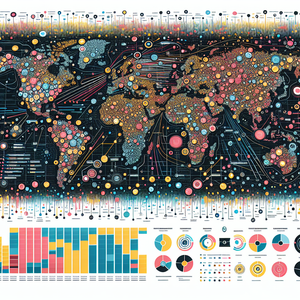
Exploring Careers in Web Analytics: Roles, Responsibilities, and Skills for Success
As the digital landscape evolves, the importance of web analytics becomes increasingly pronounced for businesses aiming to understand user interactions, optimize their online presence, and elevate customer satisfaction. With an array of advanced tools like Google Analytics, Adobe Analytics, and others, organizations can gather invaluable data about website traffic, user engagement, and conversion metrics. This data serves as the backbone for informed, data-driven decision-making, influencing marketing tactics and enhancing overall business performance. Given the multitude of features these analytics tools offer, companies must select solutions that align with their specific objectives and challenges. As the demand for insightful data analysis rises, so too does the spectrum of career opportunities within the realm of web analytics. From data analysts to digital marketing experts, each role contributes uniquely to the overarching goal of harnessing data for improved business outcomes. This article explores various career paths in web analytics, detailing their responsibilities and the skills necessary for success.
Job Summaries:
Web Analytics Specialist:
- A Web Analytics Specialist is responsible for gathering and interpreting data from digital platforms.
- Utilizing tools like Google Analytics and Adobe Analytics, they track user behavior and pinpoint trends that guide business decisions.
- Strong analytical capabilities and proficiency in web analytics tools are crucial, alongside effective communication skills to relay insights to stakeholders.
- A bachelor’s degree in marketing, data science, or a related field is typically required.
Digital Marketing Analyst:
- Digital Marketing Analysts assess the effectiveness of various marketing campaigns.
- By analyzing metrics such as click-through rates, conversion rates, and audience engagement, they offer actionable insights to refine digital strategies.
- Familiarity with data visualization tools, as well as a solid understanding of SEO, PPC, and social media metrics, are essential.
Data Scientist in Digital Analytics:
- This advanced role involves employing sophisticated analytical techniques to extract deeper insights from web traffic and user interactions.
- Data Scientists manage large volumes of data, utilizing statistical methods and machine learning algorithms to forecast trends and enhance user experiences.
- Typically, a master’s degree in data science or a related discipline is required.
Conversion Rate Optimization (CRO) Specialist:
- CRO Specialists focus on increasing website conversion rates through data-informed strategies.
- They analyze user behavior to identify barriers to conversion and suggest enhancements based on analytical findings.
- Skills in A/B testing and user experience design are essential.
SEO Analyst:
- SEO Analysts utilize web analytics to boost search engine rankings and organic traffic.
- By examining website performance metrics and user behavior, they contribute to effective SEO strategies.
- Familiarity with tools like Google Search Console and SEMrush, along with a good understanding of HTML and content management systems, is crucial.
Business Intelligence Analyst:
- In the context of web analytics, Business Intelligence Analysts deliver insights regarding business performance through data analysis.
- They track key performance indicators (KPIs) and other business metrics using various analytics tools.
- Transforming raw data into strategic recommendations.
User Experience (UX) Researcher:
- UX Researchers seek to understand user behavior through both qualitative and quantitative research methods.
- By analyzing web analytics data, they identify user pain points and areas for website enhancement.
- Skills in user testing and familiarity with web analytics tools are essential.
Marketing Automation Specialist:
- These specialists integrate analytics data to optimize digital marketing campaigns.
- By tracking user interactions and leveraging automation tools, they deliver personalized content tailored to user behavior.
Data Visualization Specialist:
- Focused on transforming complex data into comprehensible visuals
- Data Visualization Specialists use tools like Tableau or Power BI
- They highlight trends and insights derived from web analytics data
Web Analytics Consultant:
- Consultants in this field provide businesses with guidance on implementing and optimizing web analytics tools catered to their specific needs.
- They offer strategic insights and help develop actionable plans to improve website performance.
As the landscape of web analytics continues to advance, professionals in this field are poised to make meaningful contributions to their organizations. With a variety of career paths available, individuals interested in web analytics should reflect on their skills and passions when selecting a trajectory. By gaining a clear understanding of the responsibilities and requirements associated with each position, aspiring professionals can better equip themselves for success in this dynamic and rewarding sector.
Explore More Jobs
